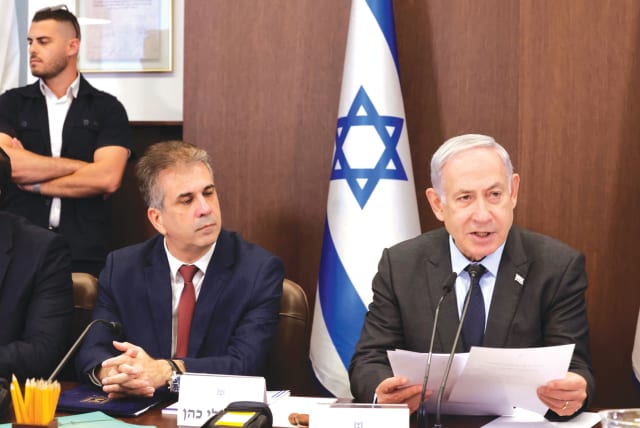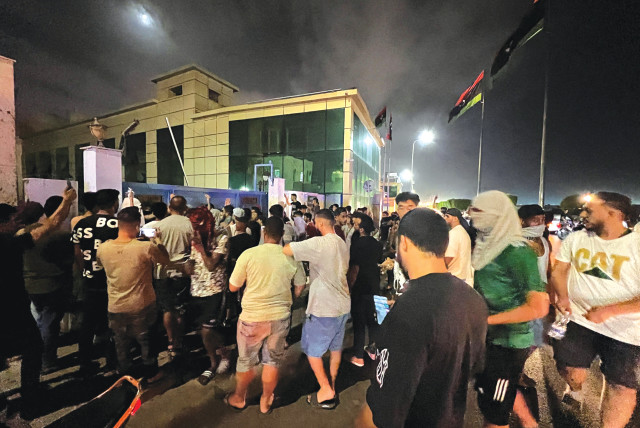Netanyahu chastises Cohen over Libya, as FM lands in Bahrain

Cohen went public last week about his meeting in Rome on August 26th with his Libyan counterpart Najla Mangoush.
Israeli Prime Minister Benjamin Netanyahu publicly chastised his top diplomat Eli Cohen for disclosing a secret meeting about forging ties with Libya, just as the foreign minister flew to Bahrain on Sunday to strengthen Israeli ties with that Gulf state.
Cohen went public last week about his meeting in Rome on August 26th with his Libyan counterpart Najla Mangoush. She was fired for holding that meeting, forced to flee her country, and is now under investigation.
“It is not helpful, now that's clear," Netanyahu told Cypriot TV station ANT1 when asked about Cohen’s decision to publicize the meeting, even though the foreign minister had not coordinated that move with the Libyans.
The news triggered protests in Libya, which does not recognize Israel and where pro-Palestinian sentiment is strong, and led Prime Minister Abdulhamid al-Dbeibah to fire Mangoush.
In the immediate aftermath of the debacle last week Netanyahu declared that all secret diplomatic meetings as well as their publication, must be cleared with him.
Netanyahu pointed to that new directive in his interview with Cypriot TV on Saturday.
“I have issued a directive to all our government ministries that such meetings of this kind have to be cleared in advance with my office and certainly their publication has to be cleared in advance with my office,” he told Cypriot TV.
Netanyahu defended Israel’s diplomatic record including its record of discretion with behind-the-scenes diplomacy.
Cohen’s actions were the “exception to the rule,” Netanyahu said, adding that he would make sure it was a “one of a kind exception.”
“There have been innumerable confidential contacts made between Israeli and Arab leaders, and Muslim leaders. In fact, many of them took place in Cyprus,” Netanyahu recalled.
“The government of Cyprus has been very helpful over the years, very hospitable and very discreet and confidential in enabling this meeting including some of that led to the Abraham Accords,” he said.
It is “important to maintain these discrete channels, which eventually can blossom and flower into open relations, but not necessarily in an uncontrolled way,” Netanyahu said.
Cohen defends foreign ministry
In an Aug. 28 social media post pushing back against the furor, Cohen defended his ministry for "always working in overt and covert channels, and in a range of discreet means, to bolster Israel's foreign relations."
The Libyan debacle which has been widely criticized in Israel and abroad, comes as Israel is looking to expand the US-backed Abraham Accords of 2002, under whose auspices Israel agreed to normalize ties with four Abraham countries: the United Arab Emirates, Bahrain, Morocco and Sudan.
Analysts say Dbeibah and other Libyan leaders have attempted to build ties with Israel in the hope that the United States, which sees Arab normalization of relations with Israel as a priority, would support them in Libya's internal political rifts.
Israel, for its part, is keen to pursue discreet talks with potential Arab and Muslim partners in the hope that they will develop into full ties. The Biden administration and Israel have focused in particular on a possible Saudi deal.
“We are working with the American government and with the Saudi government about [a] possible normalization and peace agreement. That is something in discussion, there are important issues to be resolved,” Netanyahu told the Cypriot Channel ANT1.
“It is important to note that we already have a measure of normalization with Saudi Arabia, even before the Abraham Accords Israelis already flying over the air space of Saudi Arabia to the Gulf States,” Netanyahu said.
He pointed to the emergency landing made in Jedda by a plane of Israelis returning home from the Seychelles in east Africa.
"If I told you 10 years ago that a plane full of Israel would have an emergency landing in Saudi Arabia, people would have been nervous,” Netanyahu said. Now, he said, there is no need to be nervous because “of this friendly attitude” due to “this gradual normalization of relations,” Netanyahu told the Cypriot television station.
On Sunday evening, Cohen kept his face to the future, as he landed in Bahrain for his first trip to an Abraham Accord country. He arrived with a business delegation and is expected to focus in particular on boosting trade and economic cooperation.
“We continue to strengthen the Abraham Accords and expand cooperation in the Middle East,” Cohen said.
Reuters contributed to this report
Jerusalem Post Store
`; document.getElementById("linkPremium").innerHTML = cont; var divWithLink = document.getElementById("premium-link"); if (divWithLink !== null && divWithLink !== 'undefined') { divWithLink.style.border = "solid 1px #cb0f3e"; divWithLink.style.textAlign = "center"; divWithLink.style.marginBottom = "15px"; divWithLink.style.marginTop = "15px"; divWithLink.style.width = "100%"; divWithLink.style.backgroundColor = "#122952"; divWithLink.style.color = "#ffffff"; divWithLink.style.lineHeight = "1.5"; } } (function (v, i) { });

